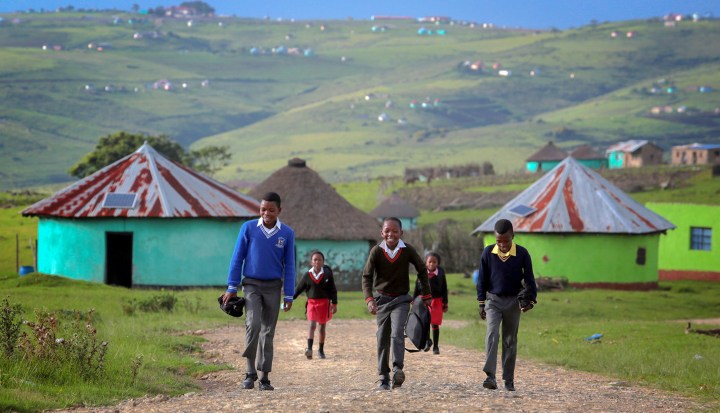CLASS OF 2023 OP-ED
South Africa’s matric results — we should not confuse quantity with quality

The reality is that the actual pass rate, when dropouts are taken into consideration, is a lot lower than the published pass rate of 82.9%. Huge problems in the education system are to blame.
South Africa’s matric (Grade 12) class of 2023, which wrote final school-leaving exams late last year, has been hailed by the country’s minister of basic education for achieving “extraordinary” results.
Of the 691,160 candidates who wrote the National Senior Certificate exams, 82.9% – that’s 572,983 – passed, up from 80.1% recorded by the class of 2022. And more candidates than ever before obtained marks that allow them to study for a bachelor’s degree.
All nine provinces managed to improve on their 2022 pass rates. This is despite the after-effects of the Covid pandemic in 2020 and 2021, when this class was in Grade 9 and then Grade 10. The results also reflect a steady uptick in the overall national pass rate, which has risen from 60% in 2009 and stabilised over the past two years at above 80%.
As is clear from this summary, the release of the results focused a great deal on the numbers. As a former teacher, school principal, education circuit manager, academic expert in curriculum studies and current vice-dean of teaching and learning at Stellenbosch University in South Africa, I would caution against this approach. South Africans should not confuse quantity with quality.
The fanfare and hype around the results risk obscuring the big picture, which is that the actual pass rate – when dropouts are taken into account – is far lower and has been for many years.
This points to huge problems within the education system.
‘Real’ numbers
This year, as has become the case annually, there’s been furious debate between politicians and education experts about the quality of the results.
Some experts openly say the government is striving for numbers instead of focusing on quality.
For example, a matric class in a township (underdeveloped, generally urban areas largely inhabited by black South Africans) will boast a pass rate of 80%. But only a few of those matriculants qualify to study at a university.
The essence of the debate revolves around what some call the “real” pass rate, measured by the number of matriculants who passed as a fraction of the number who started school together 12 years earlier.
In 2012, 1,208,973 pupils entered the first year of school, Grade 1. Of these, only 928,050 were in Grade 11 and only 740,566 enrolled for Grade 12 (matric) in 2023. Thus, 468,407 pupils (almost 40%) disappeared into the system.
Read more in Daily Maverick: Experts welcome matric pass rate increase but note 450,000 learners dropped out
Given this attrition, some analysts and politicians argue that the actual pass rate is only just over 55%.
This issue of “real pass rates” also plays out in the unhealthy competition between provinces. There are nine provinces in South Africa. Eight are governed by the ANC, which also governs nationally. The DA governs one province, the Western Cape. Each year when the results are released, it becomes a competition to see which province’s matrics performed best.
The Free State has achieved the best pass rate for the past five years. However, it also has the highest dropout rate of all nine provinces, leading to allegations by the DA and some analysts that authorities hold poorly performing pupils back to create a better matric pass rate. Some of those pupils will later proceed to Grade 12; others drop out entirely. For instance, almost half of the pupils in the Free State who were in Grade 10 in 2021 did not make it to matric in 2023.
By contrast, the Western Cape only performed the fifth-best but boasts a comparatively high throughput rate.
There is a strong feeling among educationists – and I completely agree – that a province’s “pass rate” should be published alongside its “dropout rate” to give a full perspective of the true situation.
What’s gone wrong
The ecstasy over the results also ignores the many challenges that the majority of pupils face daily.
Overcrowding is one big problem, particularly in primary school. The average class size for Grade 6 is 61 in Limpopo, 59 in Mpumalanga and 54 in KwaZulu-Natal. This compares poorly with some neighbouring countries, such as Botswana and Zimbabwe.
Effective teaching, especially in the basic skills such as reading and writing, is impossible because no individual attention is possible.
Add to that the fact that many schools do not have libraries and it’s clear why only one out of five pupils in Grade 4, aged on average nine or 10, can read with comprehension.
A second problem is that most South African schools do not have the necessary physical resources to create an environment conducive to learning. The lack of libraries is one example. Another is that many schools in poor communities do not have science or computer laboratories. Yet pupils are strongly encouraged to take STEM (science, technology, engineering and maths) subjects, because these are seen as giving young people the best opportunity of employment.
A glimmer of hope
It’s not all hopeless, however. There are certainly things to celebrate, including the achievements of top-performing individuals. Hard-working teachers also deserve thanks for the seldom-appreciated work they do, particularly in underresourced rural areas.
One especially beautiful story is that of the Khayelitsha Centre of Science and Technology. Situated in one of the Western Cape’s poorest residential areas, this school boasts a 2023 pass rate of 99% and 107 distinctions (a mark of 80% or higher), including 10 in mathematics.
Having carefully studied the results, I am also delighted to see how many distinctions are emerging from schools in impoverished communities which charge no fees or very low fees. It is heartening to see that pupils growing up in poverty are making a growing contribution to the pool of excellence.
These examples prove the value of good governance in schools, which creates an environment that is conducive to learning – even in the absence of resources. DM
First published by The Conversation.
Michael Le Cordeur is a professor and vice-dean of teaching and learning in the Education Faculty at Stellenbosch University.
This story first appeared in our weekly Daily Maverick 168 newspaper, which is available countrywide for R29.





















 Become an Insider
Become an Insider
Agreed quality matters. Also agree we must celebrate hardworking teachers, students and parents. In Vryheid, Filidi township school that has for years surpassed better resourced schools in both quantity and quality. This is owed to the vision of the principal and the dedication of staff, parents and students. All these people sacrifice their mornings, evenings, and holidays to improve the quality of their output.